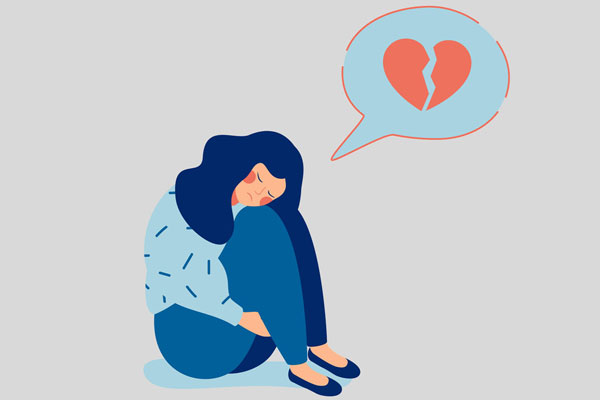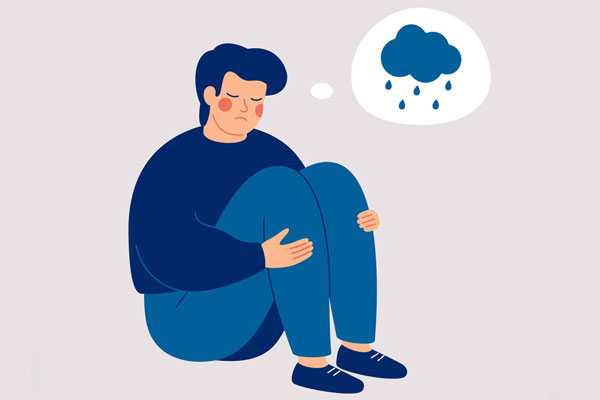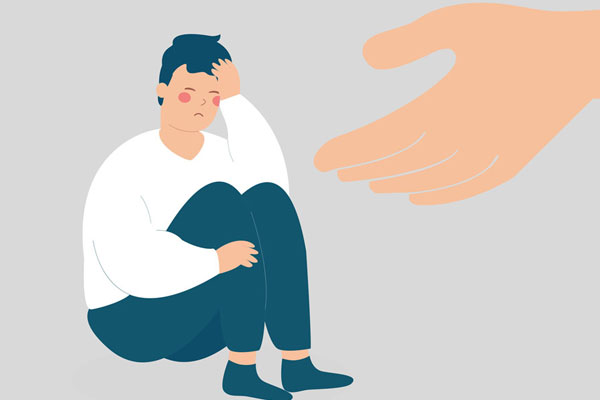Is it normal to experience the stages of grief during divorce?
Yes, it is. Even if the choice to divorce was yours or the divorce proceeded amicably, it can be hard to deal with the resulting losses and changes in your life. A divorce is a life-altering event and can bring about a host of emotions—it can even leave you feeling isolated in those emotions.
You may be surprised to learn that grief doesn’t just result from death. After divorce, your life and lifestyle are very likely changing. This loss—along with countless other losses from divorce—creates a very real, very normal grief. Grieving after divorce is painful, but it’s important to properly process your grief and experience your emotions so you can grow from your experience. Only through dealing with your grief can you begin to move forward. By working through your emotions in a healthy way, you can adapt coping techniques and get through this hard time.
Is It Normal to Feel Grief During Divorce?
We all experience loss and grief at some point in our lives. Dealing with grief is an entirely personal thing, and no person experiences it in the same manner. Grieving is the emotional process experienced following any loss, and it’s important to note that going through a divorce is undoubtedly a loss.
Divorce is a life-changing event. As such, there are a number of things lost in divorce that you may be grieving, including the absence of your spouse in your home, the loss of their friendship and companionship, a loss of security and stability, financial loss, or even a loss of time. For that reason, after a divorce, it’s important to recognize and acknowledge what you’ve lost.

“Everyone experiences grief differently, so be sure to be kind with yourself as you work through it.”
How Long Do Stages of Grief Last In Divorce?
After the loss of a loved one, you’ll often hear the adage that there is no timeline for grief. That means that there’s no set timeframe within which you should feel “over” the loss of someone close to you. It’s important to remember that, even if the divorce is a welcome end to a tumultuous marriage, you are still losing someone you once held close to you. Your loss is real, and deserves the time necessary to process this grief.
There’s no official timeline for your grief, though you may experience grief in its five stages.
Understanding these stages may help you to understand the complicated and conflicting emotions you could be experiencing.
1. Denial
Denial is often experienced as divorce is beginning, or even just before. It comes from being unable to fully process everything that’s happening and manifests as attempting to avoid the things that create conflict. Subconsciously, the purpose of denial is to give yourself more time to deal with the initial shock of loss, or avoid realizing that the loss is coming. For example, sometimes, serious issues could crop up in a marriage, but one or both parties try to avoid the issue. This isn’t because they refuse to accept that it’s happening at all, but because they wish to avoid instability and conflict and cannot recognize that the issue is too serious to move on from.
As the situation progresses from the final days of marriage to the beginning stages of divorce, you may experience emotions like shock, confusion, fear, or even elation, depending on your circumstances. Despite these emotions, denial may have you wishing you could keep your marriage alive, just for the continued stability. For others, the end of denial may have you experiencing severe stress or emotional outbursts. Coping with the grief of divorce affects everyone differently.
2. Anger
As the second stage of grief in divorce, anger can be more pronounced in circumstances where you feel as though you’ve been betrayed or lied to. Anger is also common as feelings of rejections, misunderstanding, and abandonment come to the forefront. However, a rush of pain and emotions—including anger—is likely at this stage, no matter the circumstances. You could be angry at yourself, at the divorce, or at your spouse.
Keep in mind that anger can manifest as frustration, anxiety, worry, or impatience. If left unchecked, dwelling in anger can be an extremely unhealthy coping mechanism. It’s important to realize that anger can make you act passionately in ways you don’t want to.
3. Bargaining
This stage can be seen as searching for meaning in the events you’re dealing with while attempting to explain how things could’ve turned out differently. You may be searching for concrete answers for how your relationship arrived at this point and what you could have done differently to prevent this loss. Bargaining can manifest as both guilt and negotiation.
Some people feel guilty for the failure of their marriage, while others may be more inclined to negotiate a different outcome. During this step, it can be useful to talk through your circumstances in therapy or with friends. It may also help you and your spouse decide if this is the best course of action for each of you. If this solution is something you need, reiterating those reasons to get a divorce with loved ones or a counselor can prove essential to moving past bargaining.
4. Depression
Loss and grief often becomes depression, sadness, and loneliness, especially if someone dealing with loss begins to feel isolated and detached from the world around them. This stage can manifest as guilt, exhaustion, hopelessness, or emptiness. For example, you could be focused on your guilt over the impact your loss has had on your children, or you may find little meaning in daily life as you struggle with maintaining your appetite or getting enough sleep.
While it’s important to deal with your depression and to acknowledge the reality of your emotions, it’s important to avoid remaining in a depressive state. If you have yet to talk to a professional about your emotions after divorce, now is a good time. Feeling helpless and paralyzed for too long can be damaging and hinder the grieving process.

5. Acceptance
Acceptance is the end goal of grief, and comes when you have fully processed the emotional loss you’ve suffered. Acceptance doesn’t come all at once, and the grieving process itself often isn’t a linear one. Sometimes, acceptance means only that your good days begin to outnumber your bad.
Reaching acceptance means you know that you have a new life ahead of you. In acceptance, you have come to terms with the way the divorce and subsequent loss have affected you. Once you reach acceptance, you’re more equipped to work on your new life, and move forward.
Stages of Grief After Divorce
Going through the five stages of grief after a divorce is a common way people deal with divorce losses, but it’s not the only way. For that reason, while understanding these stages can help you recognize and deal with them as they happen, the stages you experience might not be in this order. Some people may skip some stages, while others could experience several at once.
However, knowledge about what may be to come can still help you work through this difficult time of loss. Consider flipping through some books on divorce to gain perspective from different authors. If at any point during the grieving process you feel stuck and unable to move on, that may mean it’s a good time to talk with a friend or professional to deal with those emotions.
How Do I Overcome Grief During Divorce?
While there is no one way to manage your grief and work through the grieving process, there are some coping strategies you can use. These can help you deal with the pain of loss while letting time do its work to move you forward. By finding healthy ways to deal with your emotions, you can begin your new life and move on from loss.

Be Kind To Yourself
Emotional reactions can be unpredictable, and your feelings are likely to be confusing, complicated, and even contradictory. Be aware that this is both okay and normal for people experiencing grief. Don’t put pressure on yourself to recover immediately or even behave like “normal.”
Acknowledge Your Emotions
Loss and grief lead to unexpected and difficult emotions. It could be helpful for some to talk with a friend to voice your emotions, keep a journal to write your emotions, or speak your emotions out loud. Simply recognizing the emotions you’re dealing with can help you understand them.
Create Rituals for Mourning
By creating rituals or ceremonies to honor the lost aspects of your life or symbolize your transition to a new one, you can help yourself move on from loss and embrace a new life. You could create rituals to find a way to honor your marriage, move away from the trauma and negative emotions from your marriage, and reinvent the life you now have. Any action you can take to symbolize the loss and the new transition you’re undertaking can help you move forwards.
Seek Professional Support
Grief and loss are very isolating emotions, so it’s important to find the support and help you need to process them in a healthy way. Talking to a therapist or other professional can not only help you process your emotions but also make you feel less alone in your experience. Be honest about what you need for support and how your grief is impacting you and your life. There are many different methods of experiencing professional support, and just as many resources for understanding grief.
Find Meaning in Life

Part of moving on from grief, loss, and your old life is creating a new life. Whether you’re moving to a new city, seeking new job opportunities, building new friendships, or developing new hobbies and activities, it’s important to make full use of your new life. Understanding who you are as a person, what you love, who you love, and the things you enjoy, can help you discover this new stage of your life.
Get Experienced Representation
Taking action can have a stabilizing effect on emotions related to divorce. Get educated about Arizona divorce law, learning the difference between a divorce and annulment for example. An experienced attorney helps ease anxieties by educating you upon the topic of divorce law, and more specifically, the options related to an Arizona divorce.
Moving Beyond Grief During Divorce
If you’re considering divorce, know that you can handle it, and you are capable of dealing with the loss afterwards. Everyone experiences grief differently, so be sure to be kind with yourself as you work through it. Find support as you continue the process, and always look forward to the new life you have ahead of you. Divorce can be an emotional journey and starting over is hard. Never forget there is more hope on the other side-a fresh start! By envisioning the end dreams and goals you can feel your way to the path of living your best life possible.
Resources:
3. https://www.ncbi.nlm.nih.gov/pmc/articles/PMC4857700/

Jonathan Roeder, Founder/Director of Marketing of The Valley Law Group, is an Arizona native who has dedicated his life and career to the service of others. After graduating salutatorian of his high school class, Jonathan attended beautiful and prestigious Pepperdine University, where he majored in Political Science. During his tenure at Pepperdine University, his passion for helping others grew after securing a clinical position with a residential treatment center for juveniles with substance addictions. Post-graduation, Jonathan returned to Arizona and served as a residential manager for mentally and physically disabled homes.

